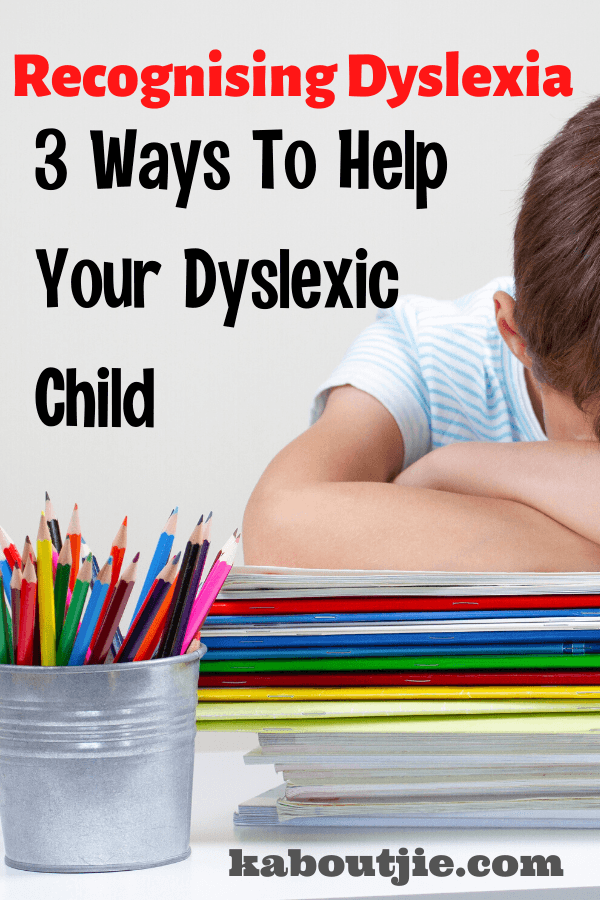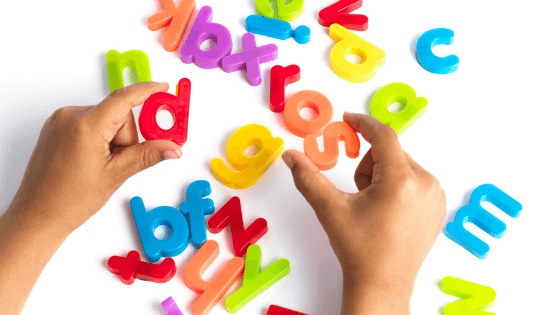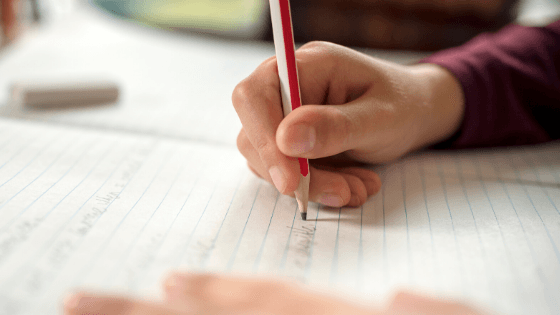Dyslexia is a learning disorder, also referred to as a reading disability. People with dyslexia have difficulty reading as a result of having issues with identifying the sound of speech and they have trouble relating to words and letters (decoding). Dyslexia influences the areas in your brain that processes language. Individuals who have dyslexia usually have normal vision and intelligence. Most kids with dyslexia can succeed academically with the aid of a specialized education program and tutoring. Even though no cure exists for dyslexia, early detection and intervention can achieve a positive outcome. In many instances, dyslexia can go undetected for many years and is only recognized when the person reaches adulthood, however, it is never too late to get assistance.
***Disclosure – This post is sponsored by Indigo Learning***

What Causes Dyslexia
Dyslexia tends to be hereditary. It seems to be associated with the particular genes that influences how the brain is processing language and reading, as well as due to environmental risk factors.
What are these risk factors?
- A family history of learning disabilities or dyslexia.
- Having low birth weight or premature birth.
- Exposure to drugs, nicotine, alcohol during pregnancy or an infection that could affect brain development of the fetus.
- Unique variances in the parts of the brain that support reading.

Recognising Dyslexia – Symptoms of Dyslexia
It is projected that about one in five children have dyslexia and that eighty to ninety percent of children with a learning disability have dyslexia. Many kids go undiagnosed and subsequently have difficulty in school and the issue is often incorrectly ascribed to environmental factors, intelligence or level of effort. The signs of dyslexia are not always easy to recognise before the child starts going to school, however, some early signs may be an indication of the problem. Once the child reaches school-going age, his teacher may become aware of the problem. The severity differs; however, the condition often becomes evident once the child starts to learn how to read.
Signs of dyslexia
A young child with dyslexia may:
- Have difficult with learning even basic rhymes.
- Have a delay in speech.
- May find it difficult to follow instructions.
- Repeat or forget short words like the, and, but.
- Find it tricky to distinguish left from right.
School-going children with dyslexia may be:
- Having trouble with sounding out new words.
- Lacking fluency when contrasted with other kids his age.
- Reading letters and numbers backwards (for example: saw instead of was)
- Having difficulty with taking notes and copying down the words from the board.
- Stumbling and are struggling with spelling even common words, often spelling them phonetically (for instance, hrbr instead of harbor).
- Having trouble with rhyming, sequencing and ordering sounds, and associating sounds with the letters.
- Not wanting to be called on to read aloud in front of the class.
- Becoming frustrated and tired from reading.
Dyslexia can also affect kids outside of school. These kids might also:
- Have difficulty in decoding signs and logos.
- Struggle when attempting to learn the rules of a game.
- Not able to keep track of multi-step instructions.
- Not being able to get the hang of telling time.
- Finding it especially troublesome to learn a new language.
- Become very frustrated, which can influence their emotional stability and mood.
What are the complications of dyslexia?
Dyslexia can cause various issues, including:
- Difficulty learning: Due to reading being a basic skill to the majority of school subjects, children with dyslexia have a significant disadvantage in keeping up with their peers in classes.
- Social issues: If left untreated, dyslexia can cause low self-esteem, anxiety, behavioural problems and aggression, as well as withdrawal from parents, teachers and friends.
- Problems in adulthood: Being unable to read and grasp certain concepts can prevent the child from reaching his full potential when growing up. This can lead to long-term educational, economic and social aftermaths.
Kids with dyslexia are at a higher risk of having ADHD (attention-deficit/hyperactivity disorder) and vice versa. ADHD can lead to difficulty enduring attention as well as impulsive behaviour and hyperactivity, which makes the disorder harder to treat.

Ways To Help Your Dyslexic Child
When must the child be assessed?
Dyslexia can start revealing itself at a young age, and preschool assessments are available for looking at a child’s awareness of his surrounding sounds that make up words, and his ability of word retrieval. It is recommended to wait until children reach the age of six and have some type of formal instruction in reading to obtain a formal assessment. As soon as the distance between the child’s intelligence and reading skills become apparent, and the evidence can be realized in first grade, it is time to get assistance. Schools often encourage parents to wait until he goes to the third grade to evaluate whether the child truly necessitates an intervention. However, some professionals argue that earlier intervention is essential for not only helping the child in catching up but also to boost his fragile self-esteem, which is influenced by continuously struggling in school and being compared to peers.
Helping a child with dyslexia
Being diagnosed with dyslexia doesn’t mean that your child will never be able to learn how to read. There are various programs designed to help these children, for instance Indigo Learning. The program emphasises on children who struggles with processing sounds and language and have a problem with phonological processing. They help children with developing the necessary auditory processing dexterities.
Programs that are designed to assist children with dyslexia must include the following features:
- Multi-sensory direction in decoding dexterities.
- Repetition and reviewing of skills.
- Intensity of intervention – being focused on at least once weekly for additional assistance.
- Teaching him individually or in a small group.
- Teaching and practicing decoding dexterities.
- Learning the child sight words.
- Teaching the child comprehension stratagems, to assist the child with deriving meaning from what he is reading.

Accommodating children with dyslexia
Kids with dyslexia are fit for accommodations in schools. These accommodations might include:
- Additional time for tests.
- A space where it is quiet for him to work.
- The choice of recording lectures.
- The choice of giving verbal, instead of written answers (if appropriate)
- Eliminating oral readings in class.
- Exemption from learning foreign language.
More ways in supporting a child with dyslexia
One of the most useful ways of supporting your child with dyslexia, or anyone that is having issues, is by encouraging activities that he enjoy doing and that makes him feel good about himself, whether taking up sports, listening to music or anything that is aimed at building confidence. To assist with reinforcing the fact that dyslexia is not an indication of intelligence, it could be useful to talk to them about well-known celebrities and successful people like Steven Spielberg or Whoopi Goldberg who have been diagnosed with dyslexia and have managed to reach success and overcome the disorder.
More things that can assist in helping a child with dyslexia are:
- Using audio books to listen to as an alternative to reading.
- Typing on a tablet or computer as an alternative to writing.
- Using apps that can make learning decoding easier and more fun.
- Using a ruler in assisting kids to read in a line, which can help with keeping them focused.

Offering emotional support
Dyslexia can often lead to embarrassment, frustration, low self-esteem and avoidance due to the difficulties of doing tasks that are done effortlessly by others. Demystifying a learning disorder with your children can help them with developing the resilience and tools they need to manage it, both in social and school environments. Things you can do to assist them are:
- Discussing the particular challenges linked to dyslexia and explaining to them why they are having difficulty in doing certain tasks.
- Acknowledging the efforts, they’ve put in and celebrating hard work, despite some mistakes. Remind them that you’re proud of them and tell them that you can see how hard they have tried.
- Help them realize their strengths.
- Combating destructive self-talk. Instead think of ideas on how you can assist these kids that are often way too hard on themselves.
Family, teachers and friends can assist children who have dyslexia by understanding that they are not lazy or stupid and they are doing their very best. It is essential to identify and appreciate every child’s strengths, irrespective if they take part in sports, art, drama, creative problem-solving, or anything else. Individuals with dyslexia should not have to feel limited in their career and educational choices. Most schools and colleges make special accommodations for kids or students with dyslexia, providing them tutors, computer software, learning aids, reading assignment recordings and special provisions for examinations. Children who have dyslexia can one day become politicians, doctors, actors, artists, corporate executive, entrepreneurs, inventors, or whichever direction they wish to go in. There are many celebrities who have dyslexia but still achieved success in their careers and other fields, despite having difficulties in school. If your child has been diagnosed with dyslexia, it is up to you as his parent to offer him the emotional support in conjunction with other ways to help him. You can make it easier for him by helping him understand that he can still achieve success in life, despite having a learning disability such as dyslexia.
 Kaboutjie SA Mommy Blogs by Lynne Huysamen
Kaboutjie SA Mommy Blogs by Lynne Huysamen





My friend’s son has dyslexia. Though is a brilliant kid but his parents and teachers have to work really hard with him. There are social relationships issues too. This post of yours is really helpful in understanding and helping kids with the most common learning disability. Thanks for this detailed and informative post, Lynne.
I also have a friend that has a dyslexic child, it is tough but with some specialized assistance it can be improved in a huge way!
Thank you for providing so much information on dyslexia. It is important that the condition is diagnosed early on so that the child can be helped to improve his skills according to his abilities. With the improvement in technology, both family members and teachers can help dyslexic kids to have a better experience learning in school.
Yes the earlier the better!